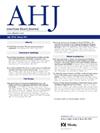卡维地洛和美托洛尔对Takotsubo综合征患者心血管预后的比较:一项倾向匹配的队列研究
IF 3.5
2区 医学
Q1 CARDIAC & CARDIOVASCULAR SYSTEMS
引用次数: 0
摘要
takotsubo综合征表现出明显的心血管并发症,需要β受体阻滞剂治疗。本研究调查了卡维地洛和美托洛尔治疗Takotsubo综合征的疗效差异。方法使用TriNetX全球协作网络,我们对18-79岁Takotsubo综合征患者进行了回顾性队列研究。在倾向评分匹配后,将卡维地洛治疗的患者(n= 4141)与美托洛尔治疗的患者(n= 18071)进行比较(每个队列4139)。结果分析了5年随访期(治疗开始后1- 1825天)。统计分析包括风险比、危险比和生存分析。结果匹配后,卡维地洛治疗患者的全因死亡率(11.3% vs 16.0%, RR=0.71, p= 0.001)、心力衰竭(16.7% vs 19.6%, RR=0.85, p=0.009)、室性心动心动(1.7% vs 2.4%, RR=0.71, p=0.033)、心房颤动/扑动(3.8% vs 6.0%, RR=0.63, p= 0.001)、急性心肌梗死(6.2% vs 8.4%, RR=0.73, p=0.004)和肺动脉高压(2.7% vs 3.5%, RR=0.76, p=0.033)均显著降低。在卒中、心源性休克或急性肾损伤结局方面未观察到显著差异。结论与美托洛尔相比,卡维地洛治疗Takotsubo综合征患者的心血管预后显著改善,特别是在死亡率、心力衰竭和心律失常方面。这些发现表明,卡维地洛可能是治疗Takotsubo综合征的首选β受体阻滞剂,可能是由于其额外的α阻断和抗氧化特性。有必要进行前瞻性研究来证实这些观察结果。本文章由计算机程序翻译,如有差异,请以英文原文为准。
Comparative Cardiovascular Outcomes Between Carvedilol and Metoprolol in Patients with Takotsubo Syndrome: A Propensity-Matched Cohort Study
Background
Takotsubo syndrome presents significant cardiovascular complications requiring beta-blocker therapy. This study investigated outcome differences between carvedilol and metoprolol in patients with Takotsubo syndrome.
Methods
Using the TriNetX Global Collaborative Network, we conducted a retrospective cohort study of patients aged 18-79 years with Takotsubo syndrome. Carvedilol-treated patients (n=4,141) were compared to metoprolol-treated patients (n=18,071) after propensity score matching (4,139 per cohort). Outcomes were analyzed over a 5-year follow-up period (1-1,825 days post-treatment initiation). Statistical analyses included risk ratios, hazard ratios, and survival analyses.
Results
After matching, carvedilol-treated patients demonstrated significantly lower all-cause mortality (11.3% vs 16.0%; RR=0.71, p<0.001), heart failure (16.7% vs 19.6%; RR=0.85, p=0.009), ventricular tachycardia (1.7% vs 2.4%; RR=0.71, p=0.033), atrial fibrillation/flutter (3.8% vs 6.0%; RR=0.63, p<0.001), acute myocardial infarction (6.2% vs 8.4%; RR=0.73, p=0.004), and pulmonary hypertension (2.7% vs 3.5%; RR=0.76, p=0.033). No significant differences were observed in stroke, cardiogenic shock, or acute kidney injury outcomes.
Conclusion
Carvedilol treatment in Takotsubo syndrome patients is associated with significantly improved cardiovascular outcomes compared to metoprolol, particularly in mortality, heart failure, and arrhythmias. These findings suggest carvedilol may be the preferred beta-blocker for Takotsubo syndrome management, potentially due to its additional alpha-blocking and antioxidant properties. Prospective studies are warranted to confirm these observations.
求助全文
通过发布文献求助,成功后即可免费获取论文全文。
去求助
来源期刊

American heart journal
医学-心血管系统
CiteScore
8.20
自引率
2.10%
发文量
214
审稿时长
38 days
期刊介绍:
The American Heart Journal will consider for publication suitable articles on topics pertaining to the broad discipline of cardiovascular disease. Our goal is to provide the reader primary investigation, scholarly review, and opinion concerning the practice of cardiovascular medicine. We especially encourage submission of 3 types of reports that are not frequently seen in cardiovascular journals: negative clinical studies, reports on study designs, and studies involving the organization of medical care. The Journal does not accept individual case reports or original articles involving bench laboratory or animal research.
 求助内容:
求助内容: 应助结果提醒方式:
应助结果提醒方式:


